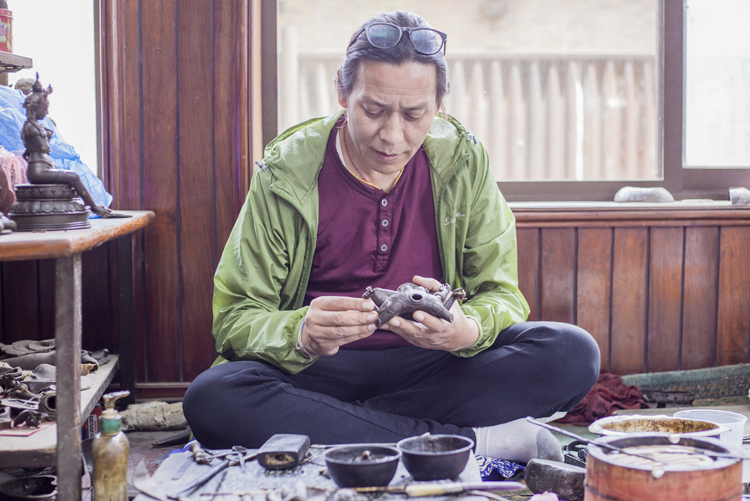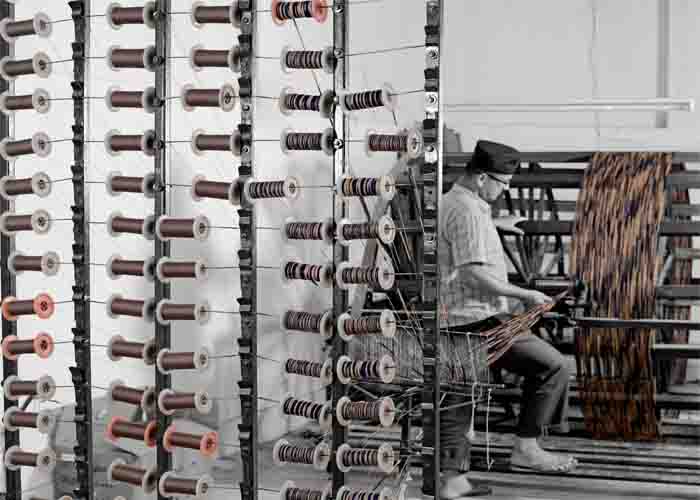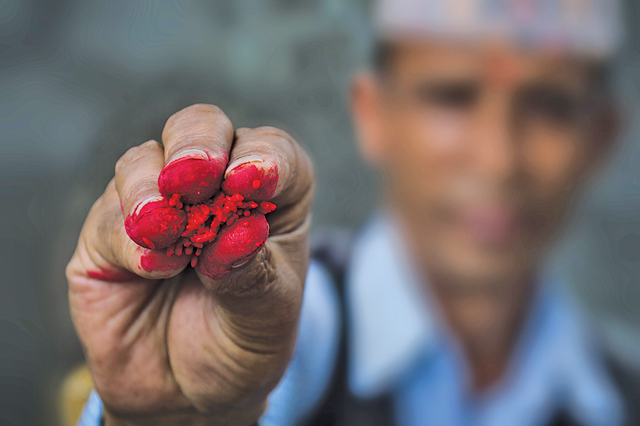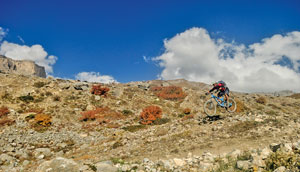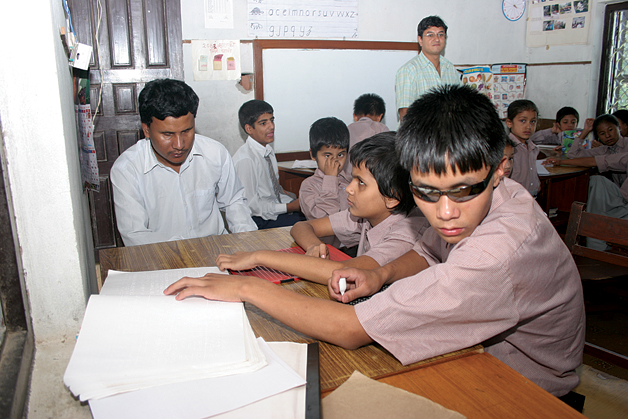
They say a child is born into this world, He needs protection.Guide, guide and protect us!!!
Ben Harper when he sang this song must have undergone the same feelings I had when I met some kids today. Ashish and Rojina sparkled with curiosity while Subash and Laki were timid, but playful characters. After our short encounter, they bade us goodbye with a popular Nepali folk song. These child singers are visually impaired students.
There is an active organization called the Nepal Association of the Blinds which works for the welfare of visually impaired people and there are a few schools around the valley where they can get a decent education.
Namuna Machhindra School
Ashish and Rojina are students of Namuna Mchhindra School in Mangalbazaar,Patan.‘Namuna Machhindra’ and ‘Laboratory School’ are two private schools in Kathmandu, which impart education to the blind. The sightless kids share the same classroom with the sighted. The blind kids are first taught Braille and then judging from their ability, are placed in various grades.
Established in 1965, The Namuna School was extended to introduce a blind section in 1986. Credit goes to ‘Mario Masuda’ of Japan who opened up the first Braille library at Thimi and provided for the library at the school in 1986. The visually impaired Masuda introduced education for the blind in Nepal and the teachers today give continuity to his legacy. The school provides teachers according to government regulations, which stipulate that there must be one teacher for every ten blind students. Bishnu Upadhyaya, a college student visits the school quite often. He had attended this school for a short period of three months. “He has consumed our salt of almost ninety days,” Buddha Laxmi, the teacher teases and Bishnu concurs.
A major problem the school faces is that each year they have to come up with new Braille books as the syllabus changes every year. An ordinary typed book is equivalent to three Braille books at least. “Six students are appearing for SLC this year. During exams, blind students are normally given extra time for writing in Braille. For SLC, they are given an hour and half added time. However the sighted students are supplied with answers from the blind students, who then write for them,” informs teacher, Purna Subba.
The school has been supported by NAWB (Nepal Association and Welfare of the Blind) while ‘Funech Germany’ is sponsoring blind students and funds are received from many organizations from time to time.
When asked if the blind students learn better if taught along with sighted kids, both Purna Subba and Bishnu say it is best growing naturally, while Bishnu strongly proclaims, “We are forward or at the least, the same in studies as the sighted students.’
Their biggest lament is that the Braille library at Thimi is not very well maintained although the place abounds in books. The teachers are of the opinion that people should consider blind people as part of the society as there are more than 3 Lakh blind people amongst us.
For details: 5521156
Laboratory Boarding School
Purna Devi Kansakar was the first blind woman to pass SLC from the Laboratory Boarding School of Kirtipur in1973 and Bunu Dahal one of their brightest students is a career consultant for blinds in the US, herself being sightless. Nestled below the hills of Kirtipur, the Laboratory School opened its doors for the sightless and sighted students in 1965 and enrolled them along with other students. Till date, eighty students have passed SLC from here while four students are appearing for this year’s SLC. Prabite Shrestha, the Braille teacher informs that in subjects like Math and Science, figurative questions are replaced by extra theoretical questions.
Sita Gyawali, a sightless Nepali grammar teacher and ex-student of the school who had studied computers in the US for nine months says, “It’s difficult checking papers. A lot of interpretation and time is needed.” Her zeal towards her duties was quite apparent as she resumed her work immediately after we left.
Being a private school, the teachers here have to prepare the Braille books themselves, besides the government books which are provided by NAWB. Prabite Shrestha informs that the blind students are very motivated and many are class toppers. “Most of them are motivated enough to pass masters,” she points out.
For details: 4330790, 4331790
Adarsh Saula Yubak H.S School
Bungmati is famous for its woodcarving and the fact that it is the resting place of the god Rato Machhendranath. The educated community of Bungmati started a library ‘Saulya Puchaha’ at a time when classrooms did not exist. Subsequently, the rapid growth of students led to the Adarsh Saula Higher Secondary School being established in 1969 and extended upto high school in 1998. Three years ago, the school went up to grade twelve.
A product of the school, Daya Ram Maharjan, the current principal of the primary school, is a man whose work does all the talking. The government school started education for the sightless in 1990. When word spread around, parents also brought their hearing-impaired children to the school. So, in 1992, the school was also opened to the deaf after which, Maharjan learnt Braille and sign language. He then registered an association for the disabled in 1997, where the disabled students of the school could be housed.
“In the resource class, the students are firstly taught Braille and then placed in the grades they are suited for. However, the deaf kids cannot be taught together with the sighted and blind kids, so most of them do not continue studies,” informs Maharjan, “there are 586 students in the primary section out of which 27 are disabled and there are two teachers each for teaching Braille and sign language.” One blind ex-student of the school, Jiwan Dongol returned and now teaches the others. The school provides the books other than that stipulated by the government curriculum which are provided by NAWB. Students come from as far as Solukhumbu, Kalikot and Rolpa. The school’s total annual fee is Rs 200/- for lower grades and Rs 500/- from grade five onwards. The disabled service association houses the blind, deaf and the disabled students of the school and takes care of their fooding and lodging.
As we leave the last school, we look back on the real stories of parents putting their disabled kids in stables along with cattle. Many such people are mistreated and schools for the disabled are doing more than imparting education, they are also providing them protection. All they need is a hand to hold and guidance.
For details: 5591549, 9841490490



